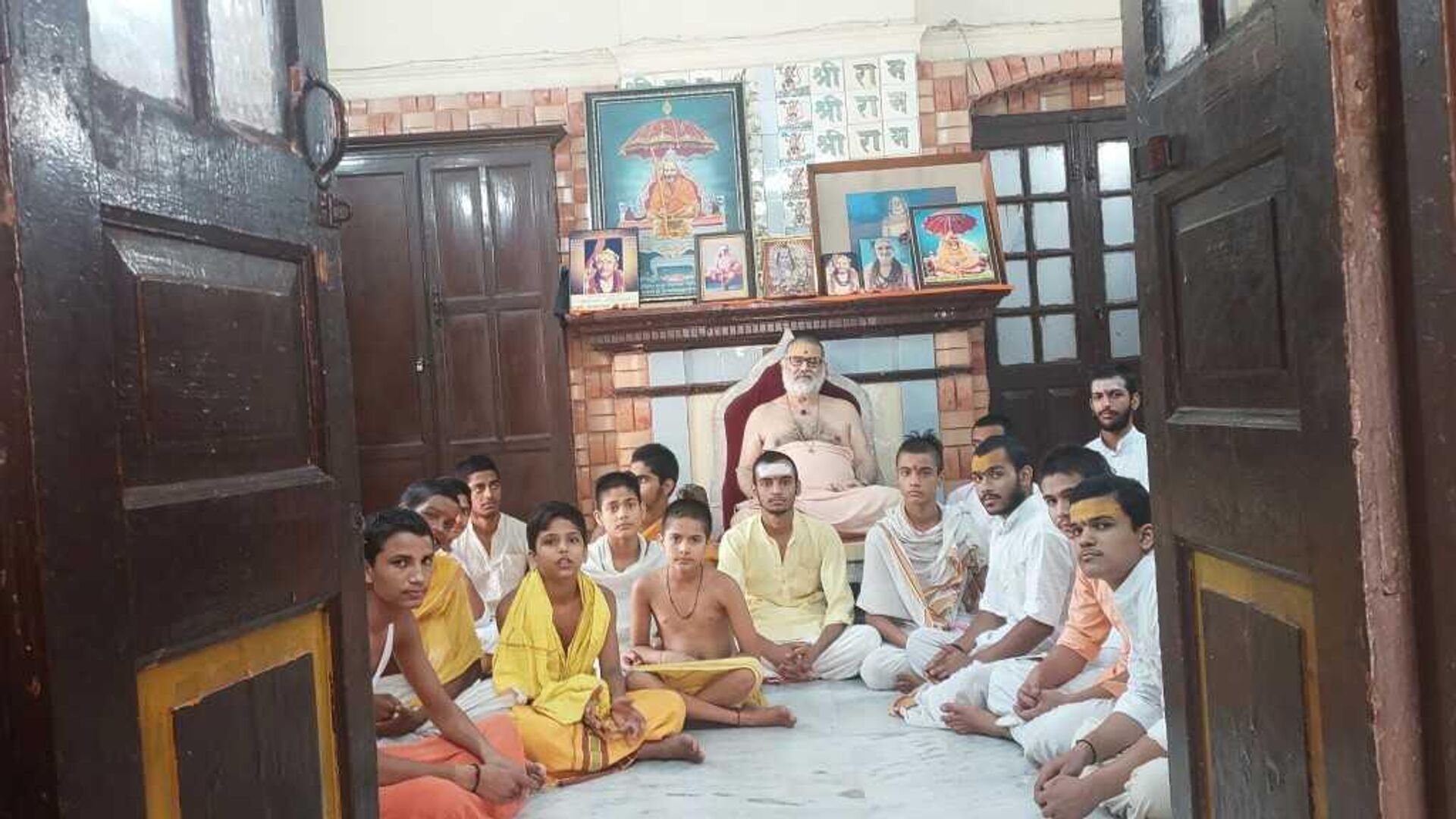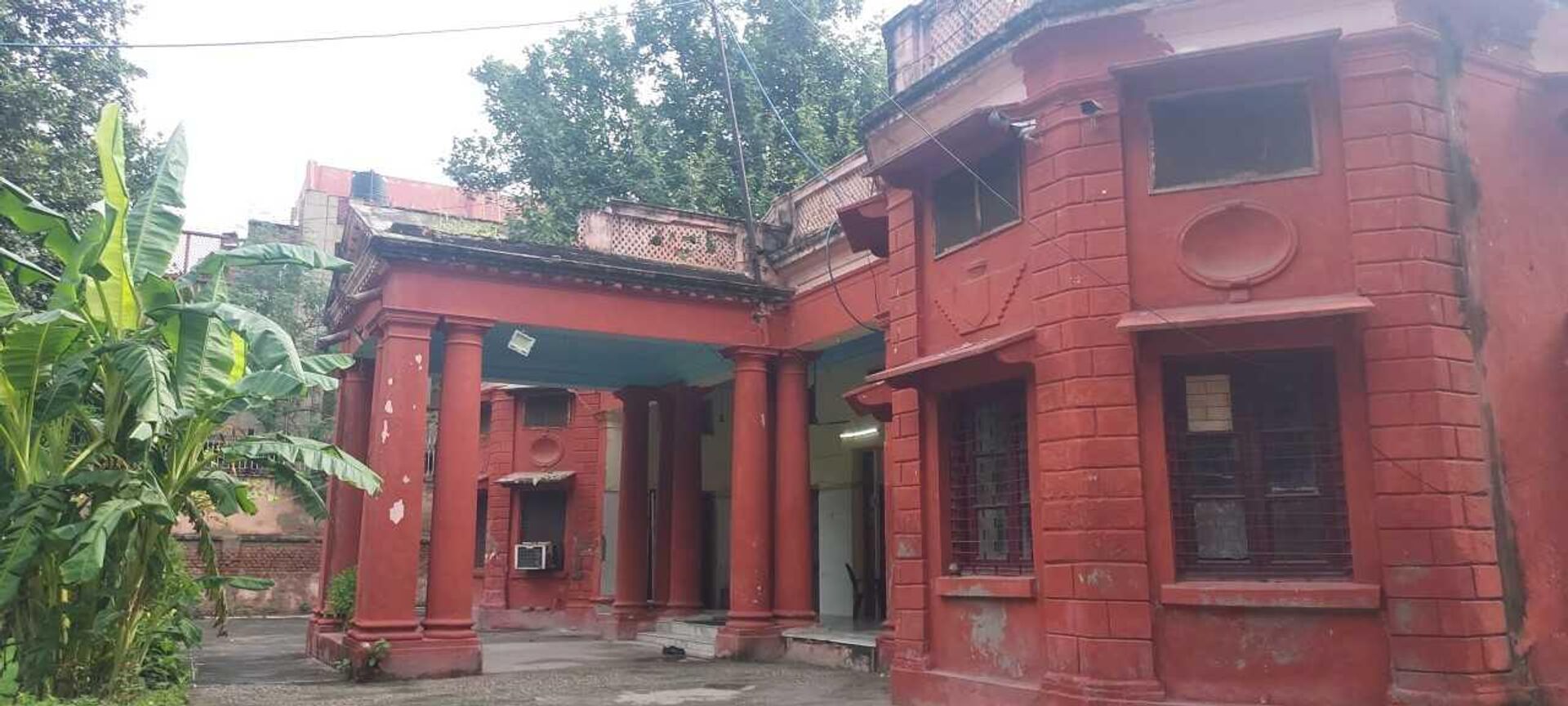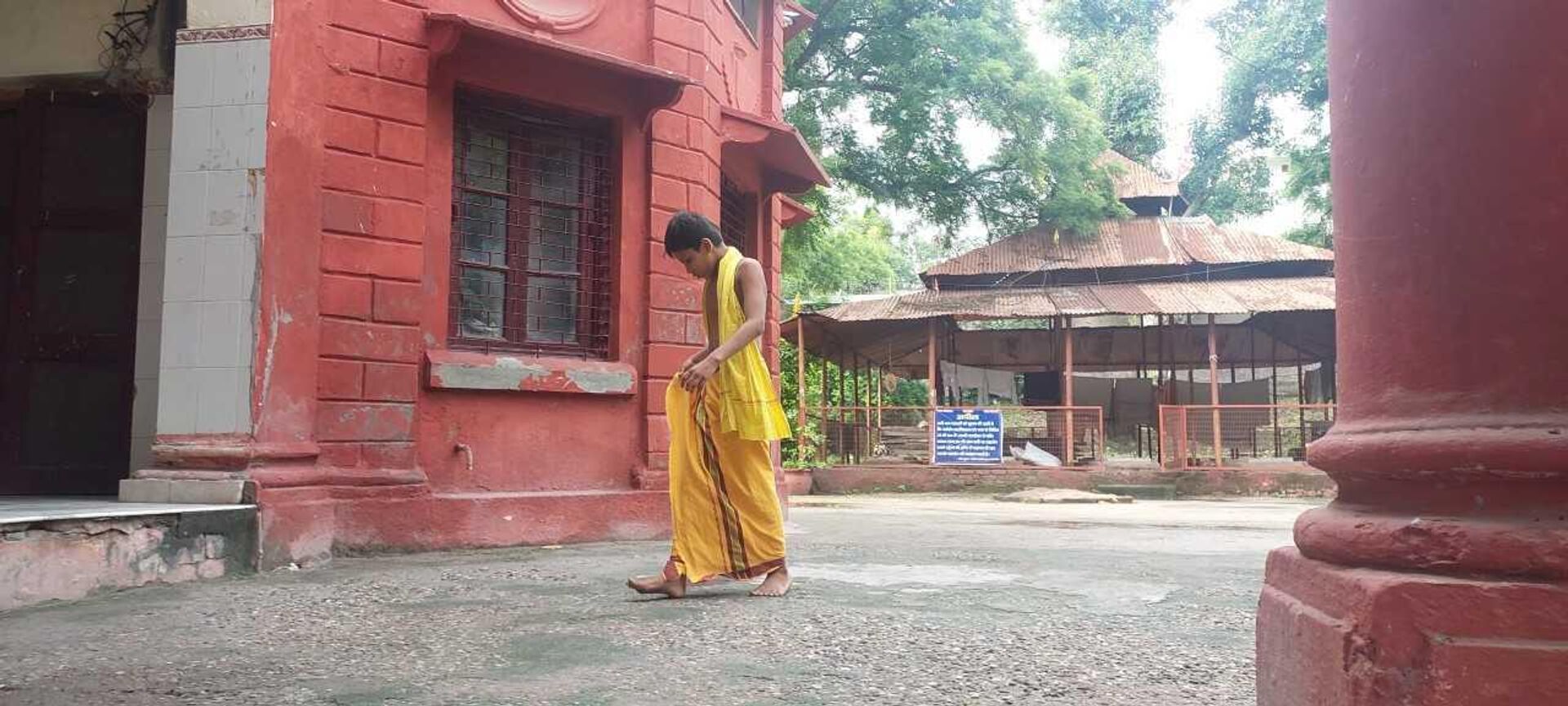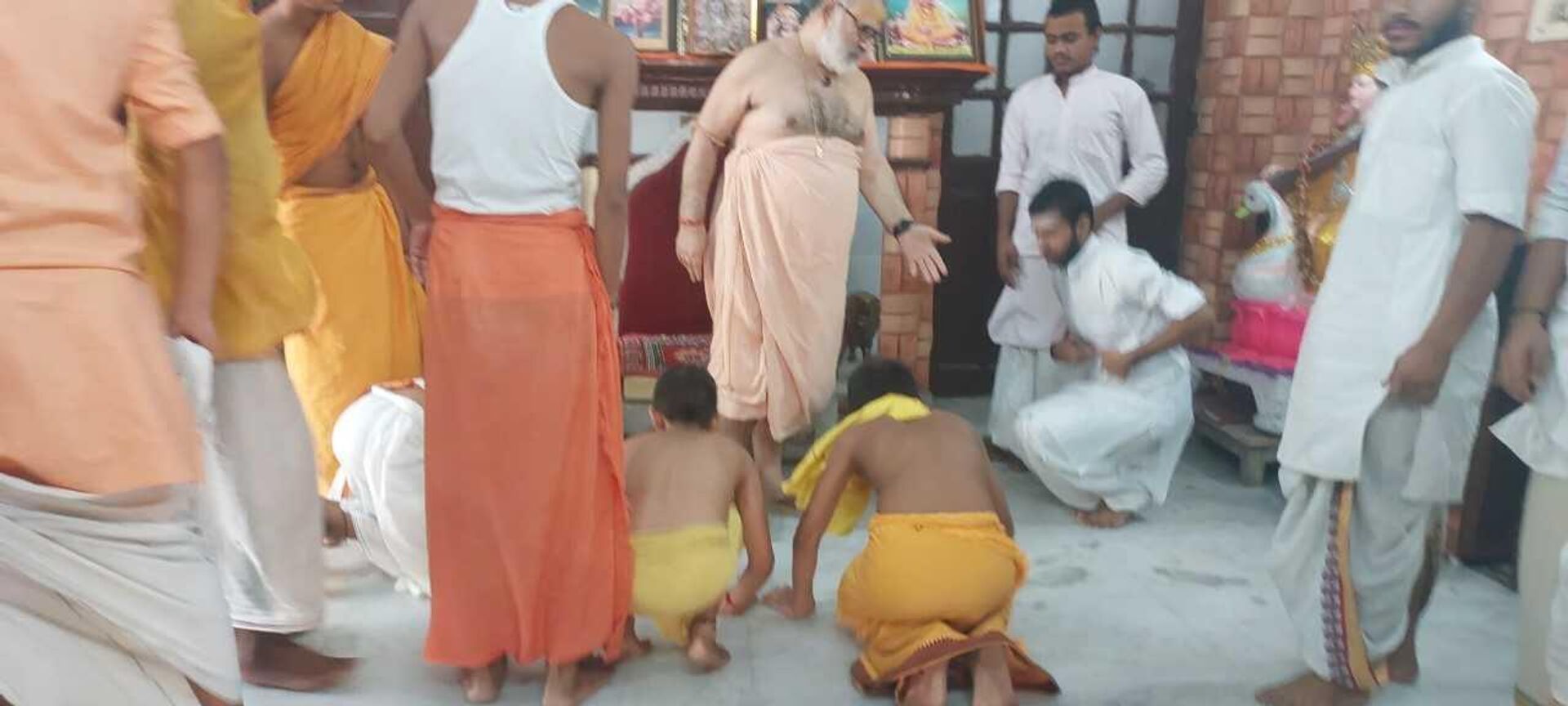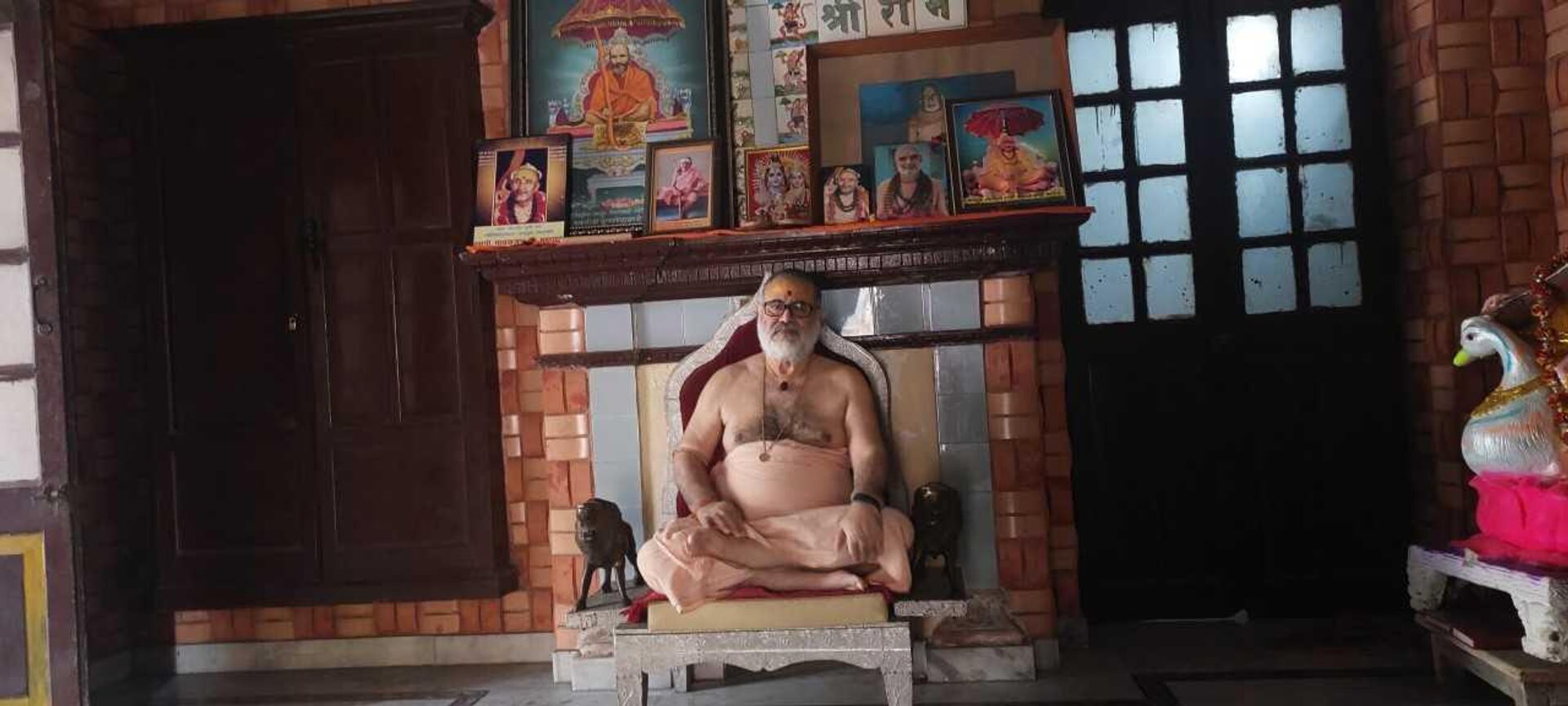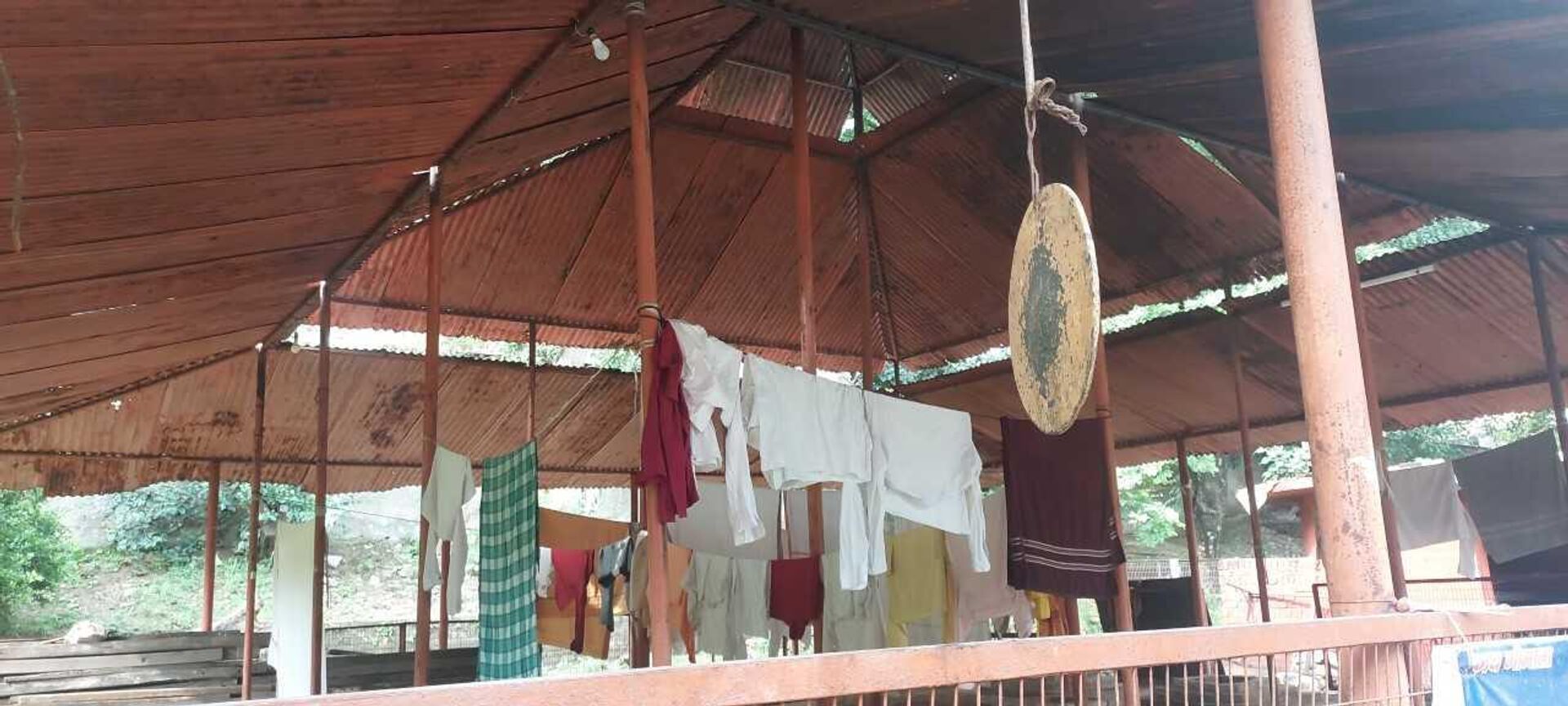https://sputniknews.in/20230831/world-sanskrit-day-students-learn-language-the-gurukul-way-3935581.html
World Sanskrit Day: Students Learn Language the Gurukul Way
World Sanskrit Day: Students Learn Language the Gurukul Way
Sputnik India
As per Pt. Akash Pandey of Shri Vishwanath Sanskrit Mahavidyalaya, today thousands study Sanskrit in Delhi alone. Shri Lal Bahadur Shastri National Sanskrit University and Rashtriya Sanskrit Sansthan being their favourite.
2023-08-31T13:54+0530
2023-08-31T13:54+0530
2023-08-31T13:56+0530
india
delhi
women's education
sanskrit
uttarakhand
sputnik exclusives
rohit sharma
https://cdn1.img.sputniknews.in/img/07e7/08/1f/3958129_128:0:1152:576_1920x0_80_0_0_dca5fc83b07d015a684ef81aa2aced09.jpg
Away from the hustle and bustle of cosmopolitan Delhi, a small group of teenagers are engaged in a unique mission at a time when most of their friends remain fast asleep: around 4 a.m.They are engrossed in reciting tongue-twisting ancient Sanskrit shlokas (verses), a routine that lasts until late evening.Everyday, they dress up as priests, sporting a little crest on their heads, and wear 'Kurta' and 'Dhoti' uniforms. They seem to be making a concerted effort to learn and exalt the glory of Sanskrit, which is believed to be used even by Hindu Celestial Gods for communication.The students of the Dharma Sangh Mahavidyalya, a Sanskrit college in Delhi's Civil Lines area, may evoke a sense of reverence. Be it their simplicity, or grit to master and promote the language, it simply fascinates.Ahead of Sanskrit Day on August 31, Sputnik India visited the college to understand the young scholars' distinct way of learning in a Gurukul setting (where students and teachers coexist as a family), their special purpose, and experience of living in austerity.To rejuvenate, the evenings may involve playing cricket, Kabaddi, and basketball.Sanskrit - A Gateway to Multiple Career OpportunitiesTalking to Sputnik India, Ronit Sharma, one of the students, shared that he dreams of joining the government's Sanskrit Department and being able to study the Vedas (religious texts composed in Vedic Sanskrit). The texts constitute the oldest layer of Sanskrit literature and Hindu scriptures.He shared that Sanskrit studies helped his cousin earn a living before becoming a 'Dharam Guru', a priest in the Indian Army. "But I wish to be a Ved Pathi (teacher) and Jyotishacharya (astrologist)," he relayed.Drive to Learn Sanskrit for a LivingSharma, now 18, believes from a livelihood standpoint that Sanskrit is so valuable that the more you learn this wealth of knowledge, the more you can earn out of it. The Initial DaysToday, whenever Sharma briefly visits his family during holidays, he doesn't require anyone's assistance. Be it washing clothes or cooking, he can manage things on his own. "We can fully take care of ourselves."Why to Study the Gurukul WayHe realizes that learning anything the Gurukul way also trains one to embrace traditional values. It familiarizes students with the nation's ancient culture. "Today, a child may feel shy to seek their father's blessing in the traditional Indian way (touching of feet). But we do it with affection and pride."Asked if it ever occurred that he was going a bit too traditional in modern times, Ronit retorted: "Not at all. If there's nothing strange about wearing ripped jeans, why should we feel hesitant about our traditional priestly dresses like 'Dhoti-Kurta' before anyone? This is our identity."According to Sanskrit-speaking Dandi Swami Parnand Teerth Maharaj, the caretaker of Dharam Sangh Sanskrit Mahavidyalay, "This institute of learning was established by Swami Karpatri Ji to primarily enable people to learn Sanskrit so that they can study Vedas and other religious texts, and carry it forward through 'Upnay Sanskaram' (transmitting divine teachings by a Guru or Acharya to the student)." He said cow protection and conservation were among its key objectives.This institute is affiliated with Jyotishpeethadheesh in Uttarakhand state near the Himalayas, known for their famous Hindu scholars and ascetics like Shankracharya Swami Madhavashram, and Swami Krishnabodhashram. Revered Swami Shungerpatri belonged to the same place and preserved this Dharm Sangha, he further told Sputnik India.According to Harish Prakash 'Vedpathi', a teacher at Dharm Sangh Mahavidyalya, the aim is to enable students to realize the treasure trove of knowledge hidden inside them. He believes since knowledge is like an ocean, students at their college are provided so much information and skills that they serve the current and even upcoming generations.Dharma Sangh's Enabling Role to Popularize Sanskrit"For jobs, you have a degree. If it's about spreading knowledge, we provide you just that in abundance. If you wish to develop mastery in Hindu rituals, we also train you in that. We give comprehensive training and knowledge. You can make a living as per your choice."Since there's no reservation for Brahmins in any field, thus the Mahavidyalaya preferably supports poverty-stricken Brahmins' kids with free meals, lodging, and clothes during the entire study period here. Only a nominal admission fee of INR 2,500 ($30) is charged, the teacher stated.
india
delhi
uttarakhand
Sputnik India
feedback.hindi@sputniknews.com
+74956456601
MIA „Rossiya Segodnya“
2023
Sandeep Datta
https://cdn1.img.sputniknews.in/img/07e7/04/07/1468069_0:258:1800:2058_100x100_80_0_0_3909870b82375b0693e9fd27915facc3.jpg
Sandeep Datta
https://cdn1.img.sputniknews.in/img/07e7/04/07/1468069_0:258:1800:2058_100x100_80_0_0_3909870b82375b0693e9fd27915facc3.jpg
News
en_IN
Sputnik India
feedback.hindi@sputniknews.com
+74956456601
MIA „Rossiya Segodnya“
Sputnik India
feedback.hindi@sputniknews.com
+74956456601
MIA „Rossiya Segodnya“
Sandeep Datta
https://cdn1.img.sputniknews.in/img/07e7/04/07/1468069_0:258:1800:2058_100x100_80_0_0_3909870b82375b0693e9fd27915facc3.jpg
sanskrit institutes or colleges in delhi, where to learn vedic sanskrit, where can i learn sanskrit for free, how to learn sanskrit for beginners, how to learn sanskrit at home, what is indian culture, what is indian culture, what is indian culture and values, what is indian culture famous for , what is indian culture upsc, what is indian culture called, what is indian culture known for, how to learn sanskrit easily, sanskrit colleges in delhi, how to learn sanskrit, where to learn sanskrit, where to learn sanskrit in india, career opportunities in sanskrit, jobs in sanskrit, what are career option in sanskrit, where to study sanskrit, when is sanskrit day celebrated in india, when is sanskrti day, when is sanskrit day celebrated in india 2023, when is sanskrit day celebrated in india 2022, when is sanskrity day 2022, mother of all languages, mother of all languages in the world, mother of all languages in india, when is sanskrit diwas, when is sanskrit word, when was sanskrit invented, sanskrit, world sanskrit day, sanskrit day, world sanskrit day 2023, world sanskrit day is celebrated on, विश्व संस्कृत दिवस, gurukul grammar school, gurukul kurukshetra, baroda gurukul, gurukul kangri, sanskrit language, how old is sanskrit language, oldest language in the world
sanskrit institutes or colleges in delhi, where to learn vedic sanskrit, where can i learn sanskrit for free, how to learn sanskrit for beginners, how to learn sanskrit at home, what is indian culture, what is indian culture, what is indian culture and values, what is indian culture famous for , what is indian culture upsc, what is indian culture called, what is indian culture known for, how to learn sanskrit easily, sanskrit colleges in delhi, how to learn sanskrit, where to learn sanskrit, where to learn sanskrit in india, career opportunities in sanskrit, jobs in sanskrit, what are career option in sanskrit, where to study sanskrit, when is sanskrit day celebrated in india, when is sanskrti day, when is sanskrit day celebrated in india 2023, when is sanskrit day celebrated in india 2022, when is sanskrity day 2022, mother of all languages, mother of all languages in the world, mother of all languages in india, when is sanskrit diwas, when is sanskrit word, when was sanskrit invented, sanskrit, world sanskrit day, sanskrit day, world sanskrit day 2023, world sanskrit day is celebrated on, विश्व संस्कृत दिवस, gurukul grammar school, gurukul kurukshetra, baroda gurukul, gurukul kangri, sanskrit language, how old is sanskrit language, oldest language in the world
World Sanskrit Day: Students Learn Language the Gurukul Way
13:54 31.08.2023 (Updated: 13:56 31.08.2023) Thousands of students currently pursue Sanskrit courses in Delhi. Some of the popular institutes, apart from Delhi University, include the Shri Lal Bahadur Shastri National Sanskrit University, Rashtriya Sanskrit Sansthan, and Delhi Sanskrit Academy.
Away from the hustle and bustle of cosmopolitan Delhi, a small group of teenagers are engaged in a unique mission at a time when most of their friends remain fast asleep: around 4 a.m.
They are engrossed in reciting tongue-twisting ancient Sanskrit shlokas (verses), a routine that lasts until late evening.
Everyday, they dress up as priests, sporting a little crest on their heads, and wear 'Kurta' and 'Dhoti' uniforms. They seem to be making a concerted effort to learn and exalt the glory of Sanskrit, which is believed to be used even by Hindu Celestial Gods for communication.
The students of the Dharma Sangh Mahavidyalya, a Sanskrit college in Delhi's Civil Lines area, may evoke a sense of reverence. Be it their simplicity, or grit to master and promote the language, it simply fascinates.
Ahead of
Sanskrit Day on August 31, Sputnik India visited the college to understand the young scholars' distinct way of learning in a
Gurukul setting (where students and teachers coexist
as a family), their special purpose, and experience of living in austerity.
At Dharma Sangh Mahavidyalaya, the day begins before dawn for everyone, and encompasses long hours of learning lessons from the ancient Hindu text 'Shukl Yajurveda', until the evening.
To rejuvenate, the evenings may involve playing cricket, Kabaddi, and basketball.
Sanskrit - A Gateway to Multiple Career Opportunities
Talking to Sputnik India, Ronit Sharma, one of the students, shared that he dreams of joining the government's Sanskrit Department and being able to study the Vedas (religious texts composed in Vedic Sanskrit). The texts constitute the oldest layer of Sanskrit literature and Hindu scriptures.
His parents were reluctant to let him live here because he was
their only child. But, finally, they gave in as the 15-year-old wanted to study. "Actually, my cousin learned Sanskrit and that inspired me. Since my father also values culture, he supported me to learn Sanskrit."
He shared that Sanskrit studies helped his cousin earn a living before becoming a 'Dharam Guru', a priest in the Indian Army. "But I wish to be a Ved Pathi (teacher) and Jyotishacharya (astrologist)," he relayed.
Drive to Learn Sanskrit for a Living
Sharma, now 18, believes from a livelihood standpoint that Sanskrit is so valuable that the more you learn this wealth of
knowledge, the more you can earn out of it.
He said: "My guru is an astrologist and settled in foreign [lands]. Initially, he earned his living as a priest and then moved abroad. He still remains in touch."
"To some, it feels a bit strange being away from family... living in a different environment. At times, it felt like our family dumped us to put up with a hard taskmaster 'Guru ji'. But gradually, we have become self-reliant."
Today, whenever Sharma briefly visits his family during holidays, he doesn't require anyone's assistance. Be it washing clothes or cooking, he can manage things on his own. "We can fully take care of ourselves."
Why to Study the Gurukul Way
He realizes that learning anything the Gurukul way also trains one to embrace traditional values. It familiarizes students with the nation's ancient culture. "Today, a child may feel shy to seek their father's blessing in the traditional Indian way (touching of feet). But we do it with affection and pride."
"When our father comes to see us off to Gurukul, we take the blessing by touching his feet with our forehead. Learnings like these come naturally at Gurukul. People do come from outside to learn Sanskrit but one imbibes the culture by staying at Gurukul."
Asked if it ever occurred that he was going a bit too traditional in modern times, Ronit retorted: "Not at all. If there's nothing strange about wearing ripped jeans, why should we feel hesitant about our traditional priestly dresses like 'Dhoti-Kurta' before anyone? This is our identity."
"We have our dress, our crest, our mark on our forehead, and a sacred thread to wear. These things identify us as 'Brahmins'," the aspiring Sanskrit scholar asserted.
According to Sanskrit-speaking Dandi Swami Parnand Teerth Maharaj, the caretaker of Dharam Sangh Sanskrit Mahavidyalay, "This institute of learning was established by Swami Karpatri Ji to primarily enable people to learn Sanskrit so that they can study Vedas and other religious texts, and carry it forward through 'Upnay Sanskaram' (transmitting divine teachings by a Guru or Acharya to the student)."
He said cow protection and conservation were among its key objectives.
This institute is affiliated with Jyotishpeethadheesh in
Uttarakhand state near the Himalayas, known for their famous Hindu scholars and ascetics like Shankracharya Swami Madhavashram, and Swami Krishnabodhashram. Revered Swami Shungerpatri belonged to the same place and preserved this Dharm Sangha, he further told Sputnik India.
According to Harish Prakash 'Vedpathi', a teacher at Dharm Sangh Mahavidyalya, the aim is to enable students to realize the treasure trove of knowledge hidden inside them. He believes since knowledge is like an ocean, students at their college are provided so much information and skills that they serve the current and even upcoming generations.
"Here the students generally do a four-year course in 'Shukl Yajurved' studies. Besides, we also conduct classes for Masters' degree students. I teach them," said Harish Prakash, who holds two 'Acharya' (equivalent to M.A) degrees.
Dharma Sangh's Enabling Role to Popularize Sanskrit
"For jobs, you have a degree. If it's about spreading knowledge, we provide you just that in abundance. If you wish to develop mastery in Hindu rituals, we also train you in that. We give comprehensive training and knowledge. You can make a living as per your choice."
He said some of their students joined the Indian Army as 'Dharam Guru', police, or working as teachers. The students are free to take up any job. "We basically empower students so that they don't have to beg for any favor to earn a living or in a crisis."
Since there's no reservation for Brahmins in any field, thus the Mahavidyalaya preferably supports poverty-stricken Brahmins' kids with free meals, lodging, and clothes during the entire study period here. Only a nominal admission fee of INR 2,500 ($30) is charged, the teacher stated.
